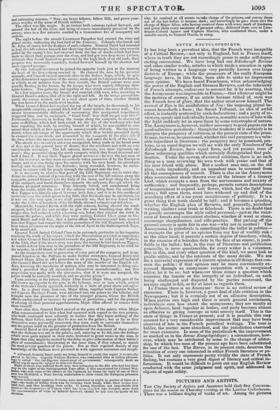REVUE. ENCYCLOPEDIQUE.
IT has long been a prevalent idea, that the French were incapable of a Critical Review,—not only in England, but in France itself, where in truth they are not exeeedingly prone to make• self-depre- ciating concessions. We have long had our Edinburgh Review and other similar works, articles in which made a sensation in spite of being written in a language very partially known over large districts of Europe ; while the possessors of the really European language have, in this form, been able to make no impression upon opinion. We have heard Frenchmen, when acknowledging the power of the English and German Reviews, and the inferiority of French attempts, endeavour to account for it by averring, that the Anonymous was impossible in France,—that whatever might be the motives of secrecy, if an article became talked of, such was the French love of glory, that the author must avow himself. The avowal of Ego is the annihilation of Nos : the imposing plural be- comes henceforth a farce; • the Secret Tribunal, an idea of awful effect, is instantly scattered by such declarations; and a party of re- viewers, openly and individually known, resemble a cave of bats with the light suddenly let in upon them by some catastrophe of nature. The Anonymous is, however, neither necessary to good papers nor to good collective periodicals ; though the tendency of it certainly is to. sharpen the pungency of criticism, in the present state of the press. It may, however, be questioned, whether this said pungency is a valu- able ingredient in literature: the pungency may be possessed, per- haps, in an equal degree we will say with the early Numbers of the Edinburgh Review, have equal force, and yet possess none of those redeeming qualities which certainly distinguished that pub- lication. Under the system of avowed criticism, there is no such thing as a man reviewing his own work with praise and that of his near friend with abuse. But a modest man may, on the old plan, write impudently, and an impudent man be screened from all the consequences of conceit. There is also on the Anonymous plan a convenient shade thrown over all the labours of a literary kind, which exempts a man from the nervousness and anxiety of authorship ; and frequently, perhaps, permits certain descriptions of temperament to expand and flower, which, had the light been always full upon them, must have withered up and died of the scorching effect of a too great sensitiveness of publicity. It is a great thing that truth should be told; and it becomes a question, whether the English plan of Reviews, and generally, periodical writing, shelters most truth or falsehood. There is no doubt that it greatly encourages the style called personal, just as the exist- ence of forests and convenient shelters, whether of wood or stone, encourage sharpshooters and rifle-practice. But picking off the general enemy is quite fair in one war—why not in another? The Anonymous in periodicals is something like the ballot in politics— it exempts the giver of an opinion from any fear of worldly risk : on the other hand, it permits a certain degree of treachery, which, in the exercise of a bounden duty in the face of an enemy, is justi- fiable in the ballot; but, in the case of literature and publication generally, is more questionable, for every writer is a volunteer. But in this, and every other question of the kind, we must look to public utility, and by the interests of the many decide. We are for a universal expression of a sincere opinion in all things that con- cern the public : if that opinion may be more conveniently ex- pressed through an anonymous corporation with a recognized editor, let it be so ; but whenever there comes a question which concerns the honour or the integrity of an individual, on such being challenged and disputed by the parties concerned, the masque ought to fall, as far at least as regards them. In France there is no Anonyme • there is no critical review of eminence. There is, however, a great deal of able criticism in the Newspapers; but it is certainly not of an offensive description. When parties run high and there is much general excitement, individuals care less about the anonymous; they are mostly at open defiance, herd together in bodies, and party becomes almost as effective in giving courage as total secrecy itself. This is the state of things in France at present; and it is possible this may account for a very considerable improvement that may have been observed of late in the French periodical writings. The tone is bolder, the matter more abundant, and the jurisdiction exercised. far more extensive. In none of the periodicals 4s the improvement so marked as in the Revue Encyclopedique; a circumstance, how- ever, which may be attributed by some to the change of editor- ship, by which two men of the present age have been substituted for one of the last. The Revue, in its present state, deserves the attention of every one interested in either French literature or po- litics. It not only represents pretty vividly the state of French feeling, but contains a very good digest of literary and critical in- formation. It would be difficult to point out any English Review conducted with the same judgment and spirit, and. addressed to objects of equal utility.


























 Previous page
Previous page